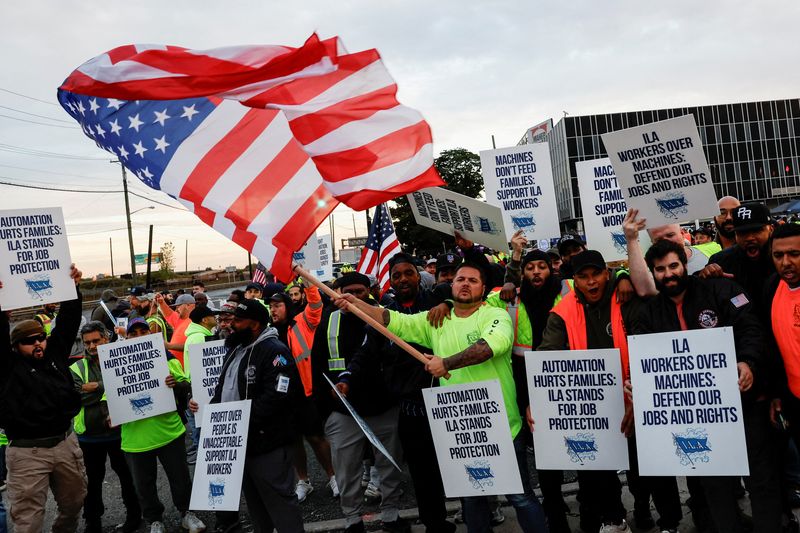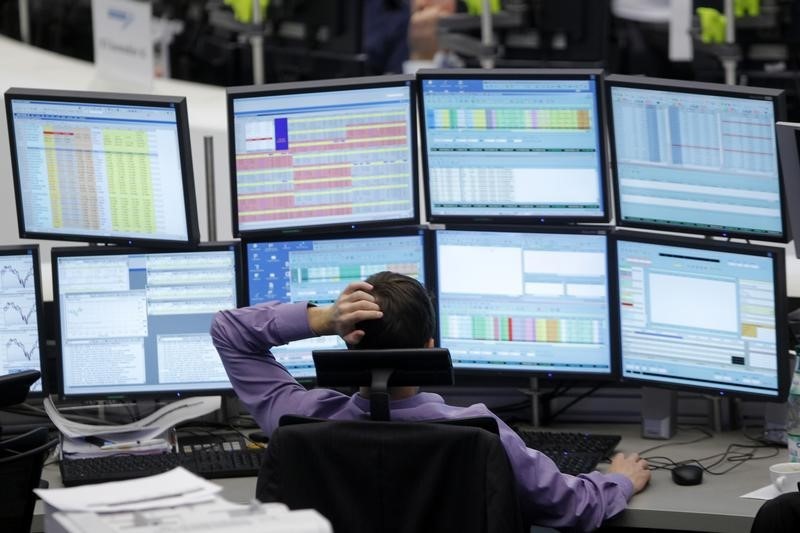By Doyinsola Oladipo and David Shepardson
NEW YORK (Reuters) – Longshoremen on the U.S. East Coast and Gulf Coast began their first large-scale strike in nearly 50 years on Tuesday, halting the flow of about half of the country’s maritime shipping, after negotiations over a new employment contract regarding wages had failed.
The strike is blocking everything from food to car shipments at dozens of ports from Maine to Texas. Analysts warned that this disruption will cost the economy billions of dollars a day, threaten jobs and potentially fuel inflation.
President Joe Biden and his administration have repeatedly said they will not use federal powers to end the strike, and on Tuesday pressed employers of longshoremen to increase their contract offers to reach a deal.
The sides are in talks, but there was no active negotiation late Tuesday and the strike appeared to be entering a second day, a person briefed on the talks said.
The International Longshoremen’s Association union, which represents 45,000 longshoremen, had negotiated a new six-year contract with the employers’ group United States Maritime Alliance (USMX) before Monday’s midnight deadline.
The ILA said in a statement that it had closed all ports from Maine to Texas at 12:01 a.m. ET (0401 GMT) after USMX’s final proposal was rejected, adding that the offer “fell far short of its requirements members to ratify a new contract”. .
ILA leader Harold Daggett has said employers such as container ship operator Maersk and its APM Terminals North America have not offered adequate pay increases or agreed to demands to halt port automation projects that threaten jobs.
“We are willing to fight for as long as necessary, to continue to strike for any period of time, to get the wages and protections from automation that our ILA members deserve,” Daggett said Tuesday.
USMX said in a statement: “Our current offer of a nearly 50% wage increase exceeds any other recent union settlement, while tackling inflation and recognizing the ILA’s hard work to keep the global economy moving.”
Daggett said the union is pushing for more, including a $5 per hour increase for each year of the new six-year contract.
The White House intervened and said it was time for USMX to negotiate a fair contract for employees.
“Shippers have posted record profits since the pandemic, and in some cases have seen profits grow by more than 800%,” White House Press Secretary Karine Jean-Pierre said, citing a surge in shipping demand since the COVID -19 pandemic. .
“It is only fair that workers who put themselves at risk during the pandemic to keep ports open also see a significant increase in their wages.”
Acting Labor Minister Julie Su said the employers’ group has “refused to put on the table an offer that reflects workers’ sacrifice and contributions to their employers’ profits.”
“The parties need to get back to the negotiating table, and that needs to start with these giant shipping magnates recognizing that if they can make record profits, their workers need to share in that economic success,” she said.
The dispute puts the labor-friendly Biden in a virtually no-win position, with Vice President Kamala Harris in a razor-thin race for the White House with Republican former President Donald Trump in the Nov. 5 election.
Trump on Tuesday blamed inflation, which he said was caused by the Biden-Harris administration.
“Everyone understands the longshoremen because they have been decimated by this inflation, just like everyone else in our country and beyond,” Fox News Digital quoted Trump in an interview.
HIGHER COSTS
The strike, the ILA’s first major strike since 1977, is worrying companies that rely on maritime shipping to export their goods or secure crucial imports. It affects 36 ports – including New York, Baltimore and Houston – that handle a range of containerized goods from bananas to clothing and cars.
Transportation Secretary Pete Buttigieg on Tuesday called on ocean carriers to drop surcharges they may impose in the wake of the strike. USMX declined to comment.
The strike could cost the US economy about $5 billion a day, JP Morgan analysts estimate.
French shipping group CMA CGM, the world’s third-largest container shipper, issued a force majeure notice on Tuesday following the strike and said it may charge additional shipping costs for delayed ships.
The National Retail Federation called on the Biden administration to use its federal authority to stop the strike, saying it could have “devastating consequences” for the economy.
Republicans, including Virginia Governor Glenn Youngkin, also called on Biden to end the strike and warned of its impact on the economy.
The U.S. Department of Agriculture said Tuesday it doesn’t expect any significant changes in food prices or availability in the near term.
The supermarket chain’s owner, Ahold Delhaize, also said it expects minimal impact on its supply chain in the short term.
BACKUP PLANS
Hundreds of longshoremen demonstrated at a New York-area shipping terminal in Elizabeth, New Jersey, holding signs and shouting slogans as music blared and vendors offered food. Daggett arrived to rally them to cheers of “ILA all the way!”
‘Everything that comes into this country comes from the containers of the ships where my men work. And I want the world to know it. Don’t come after us and say we’re greedy. Go after those greedy bastards who own these companies in this country. Europe,” Daggett told reporters.
Retailers that account for about half of all container shipping, along with other shippers, have been busy implementing backup plans to minimize the strike’s impact as they enter the winter holidays.
Many of the major players rushed Halloween and Christmas merchandise early to avoid strike-related disruptions, adding costs to shipping and storing those goods.
Retail giant Walmart (NYSE:), the largest U.S. container shipper, and membership warehouse operator Costco (NASDAQ:) say they are doing everything they can to mitigate any impact.
Danish drugmaker Novo Nordisk (NYSE:) meanwhile said it plans to find a solution to minimize or avoid production disruption, including by using air freight, CNBC reported Tuesday, citing a company spokesperson.
Lars Jensen, CEO of shipping consultancy Vespucci Maritime, said the strike was unlikely to lead to serious shortages but could increase costs for consumers if it were extended.

“At the end of the day, the only one who will end up paying for this is the American consumer, it’s as simple as that, because import costs will increase and those costs will be passed on to all importing countries.” products,” he said.
More than 38 container ships were anchored near U.S. ports on Tuesday, compared to just three on Sunday, according to Everstream Analytics.


